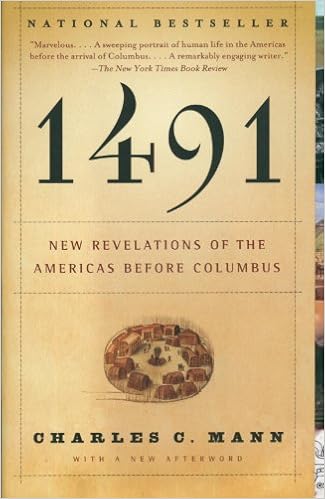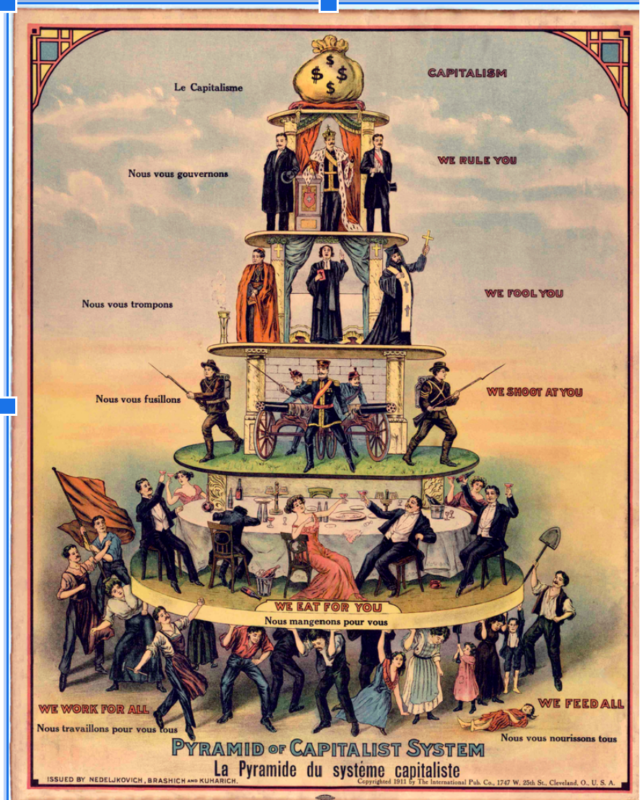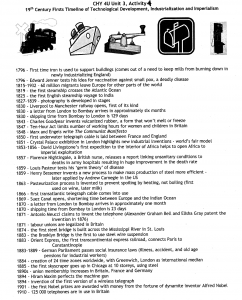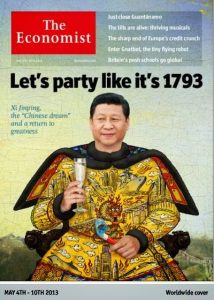Unit 3 (2023)
Unit 3: 1789 to 1900
What Re-Shaped the World?
This unit is the heart of the course: So many changes that affect our way of life now.
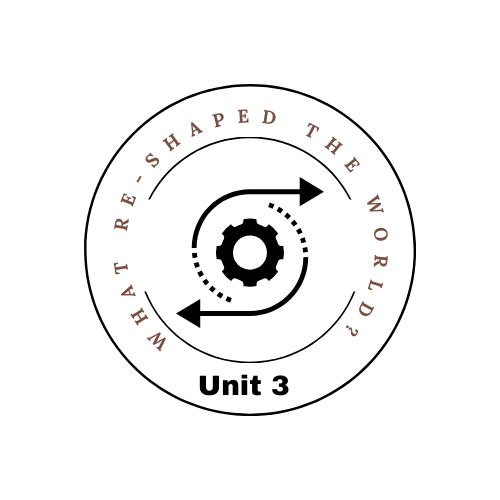
1: French Revolution (and Historiography)
Remember the Enlightenment? Now we will see what came of all of those enlightened ideas in France.
Causes of the Revolution
Minds On: In this course we have learned about reforms (Protestant Reformation), major changes (exploration of the world), and even uprisings such as those in St. Domingue/Haiti. Do revolutions really re-shape the world? What is revolutionary about this scene (below)?
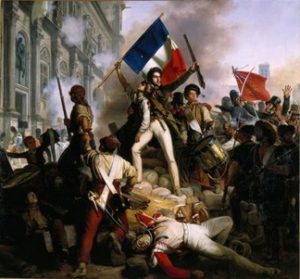
Materials and Activities:
2020_French_Revolution_Day1_Intro (PPT – updated in 2025)
CHY4U_Unit3_Fr_Rev_Causes_Sieyes_PSD –
Abbe Sieyes: What is the Third Estate? PSD – sideways in handouts.
*** Please annotate this PSD according to how each estate (1st, 2nd, 3rd) would react to Sieyes’ speech.
It is such a fantastic document because:
- it tells us the about the passion of someone like Sieyes (a member of the first estate but a third estate sympathizer)
- it illustrates some of the social, political, and economic causes of the French Revolution.
Here are some questions that will help students work through the Sieyes PSD: If students understand this document, they will be familiar with the causes of the revolution.
- Using information from the PPT, what is the proof that the third estate had been nothing in the political order “up to the present”?
- Who was the privileged order?
- What did Sieyes mean by “shackled”?
- Given that the third estate constituted the vast majority of the population, do you agree with Sieyes’ assessment that it was everything?
- What concerns would nobles have had upon reading this document?
Phase 1 of the Revolution – Constitutional Monarchy
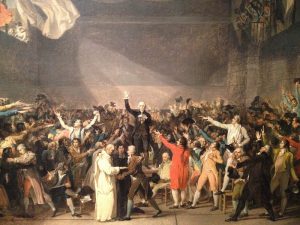
Minds On: What is the bias of the painting above of the Tennis Court Oath? Does it reflect or challenge the values, beliefs and ideas of the time (of the Third Estate)?
Materials and Activities:
2020_French_Revolution_Day2 (PPT updated in 2025 )
Declaration of the Rights of Man and of the Citizen PSD can be found on sideways in unit handouts. Annotate according to estate (1st, 2nd, 3rd). Which articles did each estate like, dislike, or could just live with? What are the overall biases of the PSD?
Here are some questions to help you work through the document (Declaration):
- Make a list of enlightened words that appear in this declaration.
- Compare article 2 to Locke’s “life, liberty and the pursuit of property.”
- In article 3, the writers insist that sovereignty (independence) resides in the nation NOW, whereas before, under absolute monarchy it would have resided in which person?
- Re-state articles 10 and 11 as “freedom of … .”
- Article 13 is particularly important from an economic and social point of view. What is meant by this “common contribution” to basically run government? How does it contrast with the burden of taxation you learned about prior to the revolution?
Phase 2 of the Revolution – Jacobins and The Terror
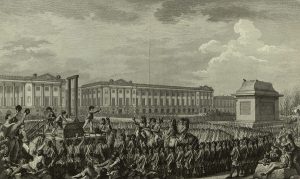
Minds On: Who is going to lose his head by the end of this lesson? What does that mean for the future of France? What do you anticipate by the word “Terror.”
2020_French_Revolution_Day3_Terror (PPT updated in 2025 )
We will try to figure this out about the Jacobins: were they tyrannical or virtuous? Did the ends (goals) they had for France justify the means (methods) they used? In other words, did they help more than hurt, or vice versa?
Before Louis was executed, he was put on trial. Sideways in handouts, you have an excerpt from “The King Must Die,” a speech made by Robespierre, the Jacobin leader, arguing for the king’s death. Please note that the Republic was declared before Louis XVI’s death.
Republic replaced constitutional monarchy. France was at war with most of the rest of Europe.
These questions will guide you through the document: the King Must Die PSD
- In the first few sentences Robespierre uses the past tense and some words beginning with “de” to indicate that ___________ has happened.
- What is his main argument? (see end of paragraph 1).
- What is his proof that no exception should be given to the death penalty – that Louis should be killed?
- At the start of paragraph 3 he mentions “You.” To whom is he referring?
- The last line restates his main argument. Of all the political groups in the parliament, who would have agree, and who would have disagreed.
CHY4U_Fr_Rev_The_Terror_King_Must_Die
How did the Jacobins help some people and hurt others?
Fr_Rev_The_Terror_Helped_Hurt – use pages 169 to 171 in textbook if you want more details.
To understand Revolutionary Tribunals, you should read “Jacobins” in handouts. Below you will find a summary in plain English.
Jacobins PSD – “translation” of the PSD from handouts
| Modern-day English Version | PSD |
| A verdict will be decided without any second chances. | “Decision shall be executed without appeal”
-Revolutionary Tribunal |
| When the majority makes a decision, it’s implemented ASAP. | “…and orders signed by the majority of its deliberating members…shall be executed without delay.”
-Committee of Public Safety |
| The conversations and decisions of this group will happen behind closed doors. | “The Committee of Public Safety…shall debate in secret”
-Committee of Public Safety |
| Basically anyone who has done anything that looks like it goes against the new Republic is its enemy. | “…and who by whatever appearances they assume, have made an attempt against the liberty, security, and unity of the Republic.”
-Law of 22 Prairial |
| The result of disobeying this court’s rule is death. | “The Penalty provided for all offences under the jurisdiction of the Revolutionary Tribunal is death.”
-Law of 22 Prairial |
| Whoever wants a king back in power is a traitor. | “The following are deemed to be enemies of the people: those who have instigated the re-establishment of the monarchy.”
-Law of 22 Prairial |
| People who use violence or trickery to destroy the freedom of everyone are enemies of the people. | “The enemies of the people are those who seek to destroy public liberty, either by force or by cunning.”
-Law of 22 Prairial |
To wrap up
On the whole, what can we say about the direction that the French Revolution took? Should we be surprised?
Fr_Rev_Day5_Wrap_Up (updated in 2025 )
Women in the Revolution – Historiography
Minds On: historiography is one of the layers of a cake. This course is like a cake with four layers (from the bottom up): the facts, the HTCs, historiography, inquiry.
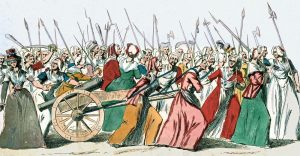
Worksheets: Rebel Daughters , DeGouge_Dec_Rights_Women_adapted (PSD)
Women in the French Revolution
patriarchy = male dominance
Historiography: feminist historiography – Feminist historians believe that women made many contributions to history. However, these contributions often have to be unearthed/dug up because history has tended to be written by men about topics that focused on men. Feminist historians don’t usually focus on top-down history such as monarchy; they prefer bottom-up or social history, the history of people’s everyday lives.
Note: we said that De Gouges was politically moderate (wanting a constitutional monarchy) and socially radical (urging reforms in many areas of life).
Websites:
Feminist school of thought (The History Learning Site)
Schools of Historiography (Library Thing)
October Days of 1789 (Law Library of Congress)
Olympe de Gouges (Internet Encyclopedia of Philosophy)
Mary Wollstonecraft (Stanford Encyclopedia of Philosophy)
Mary Wollstonecraft (BBC)
Every year I ask my students if they think women in the revolution should be taught as a separate topic or woven into the revolution topic. In 2025, this was the first year the class mostly said integrate it. I still think it has more impact separately.
2: Ideologies -Political Consequences of Industrialization
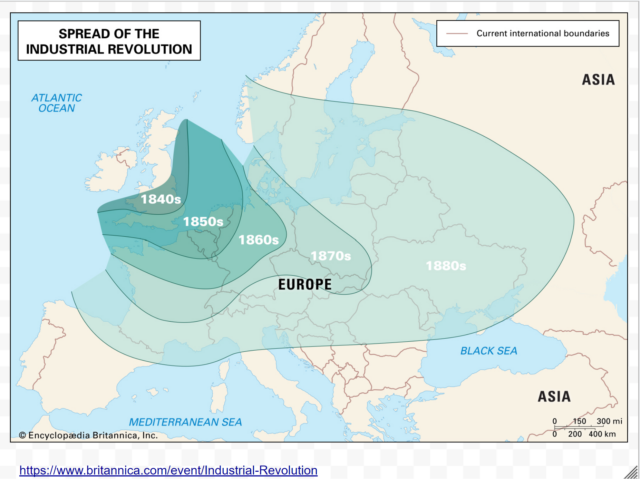
Industrialization Background
Get a sense of how industrialization changed the social and economic conditions in 19th century Britain. Recall back to origins of industrialization in unit 2.
Political_Consequences_Industrialization_Day1 (PPT updated in 2025)
Answer: Predict (guess) what impact these social changes might have had on people’s political views? (their view on government, what it should do for them, what its role is, etc.)
The definitions below might come in handy as we proceed through this short topic.
definitions:
capitalism = an economic system that strives to make a profit and desires little government intervention in the economy
free trade = the opposite of mercantilism – a policy of letting countries trade with whom they want
proletariat = the name Marx and Engels gave to the unskilled workers (working class)
bourgeoisie = the educated middle class that Marx and Engels felt dominated government through their ownership of the means of production (factories)
feudalism = Middle Ages where the nobles owned land and had titles
class consciousness = the awareness of people who have a similar plight to you (e.g., of the workers)
seating arrangements in France’s National Convention in 1792 = the radical Jacobins sat on the LEFT, the moderate Girondins in the CENTRE, and the conservative Royalists on the RIGHT
suffrage = the right to vote
Ideologies
Liberalism and new liberalism show us how an ideology could be affected by the social and economic changes in a country. We’ll also see the connection between ideologies and the lack of full democracy in Britain in the late 1800s. You will need the Ideologies chart from the unit 3 handout package.
Political_Consequences_Industrialization_Day2_liberalism (PPT updated in 2025)
CHY4U_Unit3_Ideologies_Day2_Debrief (political compass)
Today we will be looking at the impact of the lack of democracy and clout for the working class. We will interpret an excerpt from Marx and Engels’ Manifesto of the Communist Party.
Political_Consequences_Industrialization_Day3_Marxism (PPT updated in 2025)
CHY4UMarx and Engels PSD– make sure you are able to answer the questions on this sheet.
Key questions to jog your memory:
- Why did Marx and Engels think revolution would happen in industrialized countries?
- Why did Marx and Engels think that workers could not turn to the government for help/support?
- What kinds of things did Marx and Engels want to centralize after the revolution?
- What would now be controlled by the state after the revolution?
- Why weren’t all workers attracted to a Marxist political view? (Remember new liberalism and how it sought to attract workers once they got the vote).
3. Imperialism
Imperialism Intro
CHY4U_Imperialism_Day1 (PPT updated in 2025)
Three Motivations for Imperialism
- economic (resources, labour, markets)
- national prestige (other countries have colonies – why not us?)
- conversion to Christianity
Enabling Factor = technology – did technology make the world smaller? I love starting the unit with students identifying the top three technologies they THINK might enable imperialism the most. This becomes a hypothesis they can check later in the unit.
Two Perspectives on Imperialism
Source 1: map below from 1909 – what advantages might a British imperialist see of the imperialism?
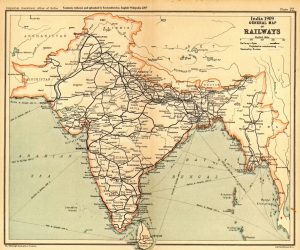
Source 2: quote below by Indian nationalist (anti-imperialist) Bal Gangadhar Tilak. What disadvantages might a nationalist see of imperialism?
Tilak addressing the Indian National Congress in 1907:
“One thing is granted, namely, that this government does not suit us. As has been said by an eminent statesman – the government of one country by another can never be a successful, and therefore, a permanent government. …One fact is that this alien government has ruined the country. In the beginning, all of us were taken by surprise. We were almost dazed. We thought that everything that the rulers did was for our good …We are not armed, and there is no necessity for arms either. We have a stronger weapon, a political weapon, in boycott. We have perceived one fact, that the whole of this administration, which is carried on by a handful of Englishmen, is carried on with our assistance. We are all in subordinate service. … I want to have the key of my house, and not merely one stranger turned out of it. Self-government is our goal; we want a control over our administrative machinery. We don’t want to become clerks and remain [clerks]. At present, we are clerks and willing instruments of our own oppression in the hands of an alien government, and that government is ruling over us not by its innate strength but by keeping us in ignorance and blindness to the perception of this fact.”
Tilak, 1907
Note on terminology: colonist = someone who lives in the colony but is not native to it (i.e., American colonists in the 13 colonies, not Indigenous people such as the Iroquois; British East India Company officials and their families in India, not Indians).
Nationalism and Imperialism = 2 sides of a coin
- Empires like Russia, Austria-Hungary, Ottomans, and Britain controlled a lot of territory. People in the “mother-country – ONE of the small boxes)” might have a lot of pride and nationalism in the fact that their empire was so big. However, people in the colonies might have felt otherwise; many wanted to have independence for themselves.
- Empire = big box (the whole)
- Colonies = small boxes (the parts)

Intro to imperialism through maps
Create inquiry questions about each map (also think about key connections to the topics of industrialization and enslavement)
CHY4U_Imperialism_Maps (this is one of my favourite PPTs – students analyze the maps and come up with questions about them)
A: Congo Case Study
Minds On: Think of a resource that is highly prized today that has caused social and environmental damage because of its harvesting/mining? A past example might have been rubber (natural rubber, that is) that was popular due to the late 19th century bicycle craze. See history of cycling.
What does this word mean to you?
civilization
?
Materials for Congo Case Study
White king, red rubber, black death video excerpt (historical perspectives)
Congo_Imperialism_Case_Study (PPT)
Decree of Leopold II_psd (not in handouts)
CHY4U_Unit3_Imperialism_Congo_Day5_Debrief
Skill: analysis of “official” documents: We will look at a lot of PSDs in this lesson. We’ll learn that trusting something because it’s an official document is not always wise. We’ll also see how the intended audience of a PSD can affect its wording, bias, tone, etc.
B: China and Imperialism
Minds On: How can the results of wars reshape the world? Read the Treaty of Nanjing for clues as to how China’s relationship with Britain was re-shaped after Britain defeated China in the first Opium War.
Quick check back with the end of unit 2 – we didn’t discuss this part of the China lesson:
The exchange of ideas and goods was not always preferred by states. Chinese exchange in the 18th century was based on an ancient system of tribute, and the Chinese had no incentive or interest in trading with the European “barbarians.”
Below is an excerpt from an edict from the Chinese emperor addressed to George III, King of England, in 1793;
Excerpt from Chinese Emperor Writing to George III, 1793
You, O King from afar, have yearned after the blessings of our civilization, and in your eagerness to come into touch with our converting influence have sent an Embassy across the sea bearing a memorial. I have already taken note of your respectful spirit of submission, have treated your mission with extreme favour and loaded it with gifts, besides issuing a mandate to you, O King, and honouring you with the bestowal of valuable presents. Thus has my indulgence been manifested. …
Hitherto, all European nations, including your own country’s barbarian merchants, have carried on their trade with Our Celestial Empire at Canton. Such has been the procedure for many years, although Our Celestial Empire possesses all things in prolific abundance and lacks no product within its borders. There was therefore no need to import the manufactures of outside barbarians in exchange for our own produce. But as the tea, silk, and porcelain which the Celestial Empire produces are absolute necessities to European nations and to yourselves, we have permitted, as a signal mark of favour, that foreign [trading spots] should be established at Canton, so that your wants might be supplied and your country thus participate in our beneficence. But your Ambassador has now put forward new requests which completely fail to recognize the Throne’s principle to “treat strangers from afar with indulgence,” and to exercise a pacifying control over barbarian tribes, the world over. …
Source: Asia for Educators, Qianlong Exercises, N.d. http://afe.easia.columbia.edu/ps/china/qianlong_edicts.pdf (Jan. 23, 2017)
Definition Canton: Known today and to the Chinese at the time as Guangzhou, the centre of trade between the Imperial Court of China and Europe.
Questions on 1793 letter:
- What can you infer about the emperor’s view of Western goods and ideas?
- Based on what you’ve learned in the course so far, is the king of England likely to have had the same perspective as the emperor? Why or why not?
- Note tone of Chinese superiority. Find an excerpt to support.
China_Imperialism_Day1 Part 1_Context (PPT)
China Imperialism Day 1 Part 2 Opium War
Opium War as a Turning Point
What Britain got:
- Hong Kong
- free trade
- payments to British merchants
- access to Chinese ports
For Opium War: identify and support with evidence:
- Causes of the first Opium War (long-term, medium, short?)
- Differing British and Chinese perspectives on the sale of opium (see Lin Zexu PSD).
China: Taiping Rebellion
Minds On: what is the difference between a revolution and a rebellion? Can a rebellion/revolution also be a civil war? What would be an example from history?
China_Imperialism_Day3_Taiping_Rebellion
Taiping Rebellion – annotate using headings : [also for comparison to French Revolution]
- causes: social/political/economic discontent
- causes: trigger events
- major players
- obstacles and opponents
- consequences: short term
- consequences: long term
From Taiping Rebellion to Boxer Rebellion – Why So Many Revolutions?
- the Qing government was still weak
- the economy was still bad
- some people were still feeling left out (this time people who felt that foreigners and Christians had too much power in China)
1898 Cartoon analysis: what does it show about the relationship between China and the world? What is each figure doing? Which are stereotypes?
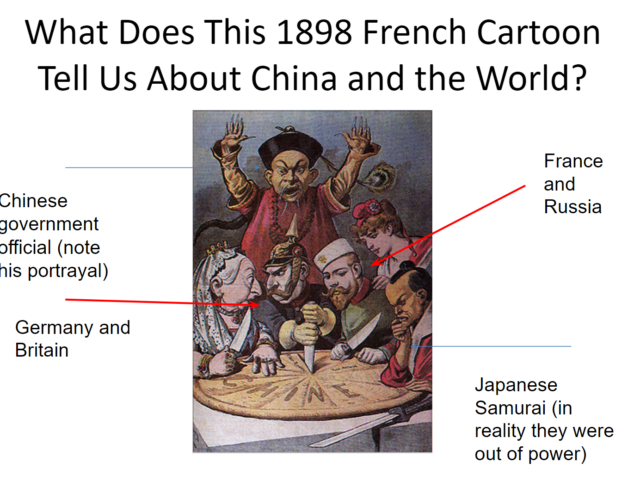
- Chinese civil servant – what is he doing?
- Queen Victoria (Britain), Kaiser Wilhelm (Germany), Russian Czar, French woman, Japanese samurai (note what he has under the table)
- Note the swords above the table cutting up the pie (Chine)
From Boxer Rebellion to 1911 Revolution
The Boxers were put down by the Qing government and foreign troops. Just over 10 years later, a third revolution overthrew the Qing dynasty. However, it doesn’t mean that the problems went away. Japan was still very powerful and put heavy demands on China in 1915. They were accepted on National Humiliation Day, May 8, 1915.
China_Imperialism_Day4_Rebellions (PPT)
Unit Wrap-Up So Far: Out of the topics we have studied so far in unit 3, which re-shaped the world most?
- French Revolution
- Industrialization
- Ideologies
- Imperialism
Go back and re-consider your original top 3 technologies that enabled imperialism. Do you still agree with your original choice?
4. Social Movements and Reform
(Abolition of Slavery in the British Empire topic has been retired)
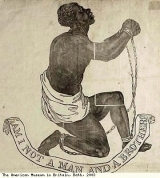
Port Cities Bristol, 1860 image used in the abolition campaign.
Do not assume that enslaved peoples just waited for whites to campaign for them. Remember all the forms of resistance enslaved peoples used in their daily lives.
Minds On: Is slavery dead and gone?
Video of slave auction in Libya (Nov. 2017)
CHY 4U Timeline of Abolition and Emancipation in the British Empire
compensation may refer to slaves and/or slave owners
progression refers to small steps (e.g., abolishing the slave trade before abolishing slavery itself)
key words:
abolition = end of slavery
emancipation = freeing of slaves
vested interests = people and groups who have invested money in slave-related industries (such as planters, shipping companies, etc.)
Possible conclusion statements to choose from:
Abolition of slavery in the British Empire was achieved entirely on humanitarian grounds.Abolition of slavery was motivated by self-interested matters.Abolition of slavery was done more with the vested interests of planters and other businesses in mind than the welfare of enslaved people.The role of slaves in their own emancipation must not be forgotten.True equality was not achieved by emancipation anyhow.Or write your own.
Women’s Rights
Minds On: What is the current state of women’s rights in Canada? Oddly, some students find it difficult to answer this question as if it is not an issue!?!
Women’s_Rights_(British Case Study) (PPT – I love using the postcards at the end)
Tasks:
- Working in teams, go through the timeline and identify answers to the question below. Teams will take turns justifying their answers as to ways that women’s lives were modernizing (no repeats allowed).
In which areas of social life were women’s lives becoming more “modern”? How so?
See timeline of women’s rights
2. Look at the anti-suffragette postcards at the end of the slides above. Explain how the image below makes use of the same themes.
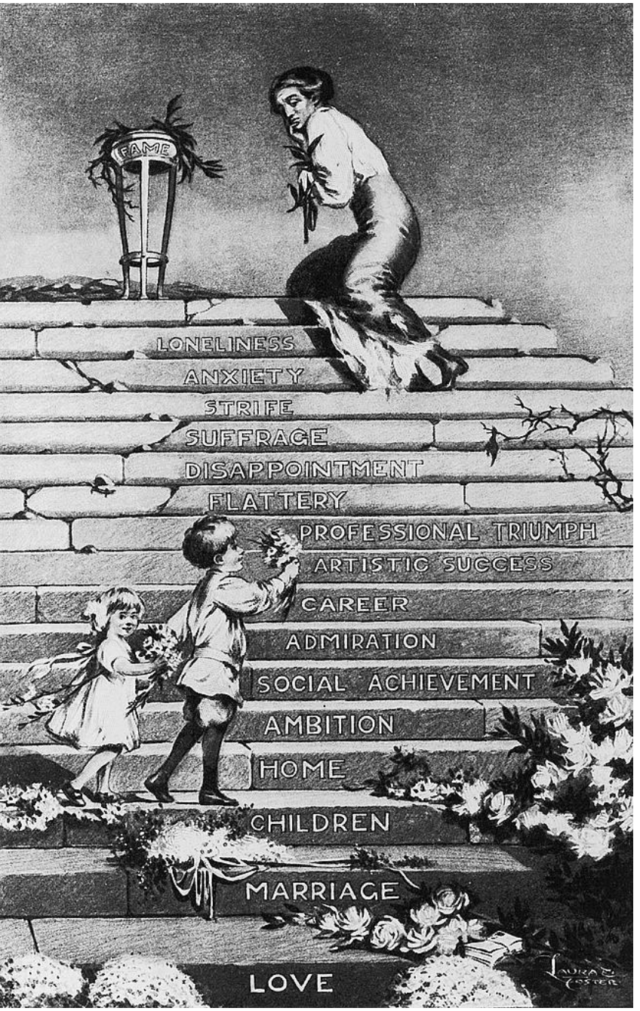
Social Movements for Equality: Same Sex Rights (2023)
Let’s get more modern and do an inquiry into the evolution of same sex rights around the world (or lack thereof).
In 2019, a UN website (International Day Against Homophobia, Transphobia and Biphobia: Justice and protection, no matter whom you love) stated the following:
The tragic reality is that in many countries lesbian, gay, bisexual, transgender and intersex (LGBTI) people face severe discrimination. They face offensive and hateful speech. Their freedom of expression and voices are silenced. Their human rights are denied, and they often cannot even access essential services such as healthcare, education, employment and housing.
Same sex relationships are still a crime in 70 countries. In seven of these countries, it’s a crime punishable by death.
…We acknowledge that many steps have been taken for LGBTI rights globally.
For example, in the past year, Angola, India, Trinidad and Tobago have decriminalised same-sex relationships. Chile, Portugal, Luxembourg, Pakistan and Uruguay have made it easier for trans people to change their legal gender.
But there is still a long way to go to achieve full equality for all.
Source: https://www.ohchr.org/en/stories/2019/05/international-day-against-homophobia-transphobia-and-biphobia-justice-and
History of LGBTQ2+ Rights Around the World
_____________________________________________
OLD – filed for now
______________________________________________________________________________________________________________________________
Imperialism – India
Fill in worksheet section on India: Western Imperialism and Non-western Responses.
Imperialism – Japan
Japan – coming out of isolation. Video (Japan: Memoirs of a Secret Empire – The Alien Barbarian) worksheet. CHY4U_Japan_Video_Perry_Questions
Japan – Meiji Restoration and rise of Japan as a world power.Meiji_Restoration_and_Japanese_Imperialism
Marxist History and Historiography and Great Man Theory of History
Now that you know what Marxism is you should be able to understand what Marxist historiography is all about and make a comparison to Great Man Theory.
Marxist Historiography (School of Advanced Studies, University of London)
From Marxist Historical Writing in Britain by Dave Renton (Making History):
“The founding figures of social history in Britain were the first editors of the journal Past & Present, launched in 1952. One part of the collective, distinguishing the journal from the majority of academic enterprises, was a small group of writers who belonged to a single generation and shared a common political heritage. They were Marxists, being members or fellow-travellers of the Communist Party of Great Britain. They were young, aged typically in their 20s or early 30s. Such figures as Rodney Hilton, Edward (E. P.) Thompson, Christopher Hill and Eric Hobsbawm are often said to have invented a new way of historical writing, ‘history from below‘, in which the emphasis was put on radical movements, social classes and the campaigns of the dispossessed. Such were the forces which had made the world. These are often said to have been their first and most distinguished historians.”
(emphasis Ms. G’s)
Great Man Theory of History
Great Man Theory (Villanova University)
For a contrast between Great Man Theory and Marxist Theory, see August Turak’s “Eight Lessons from the Great Man (or Woman) School of Leadership” in Forbes, 2013. Please note that Ms. G does not endorse this article. She is just posting it to show you how other people think.
For a subtle critique of unintentional great man theory, read the Globe and Mail’s review of historian Margaret MacMillan’s History’s People: Personalities and the Past.
Finally, to see historiography in action, we need only look to the writing of history on Columbus. See the Hampton Institute’s “Confronting Columbus: Revisionism vs. Reality.” Again, Ms. G is not endorsing this institution. She’s just showing a view on Columbus. Or, read Charles Mann’s 1491: New Revelations of the Americas Before Columbus.
